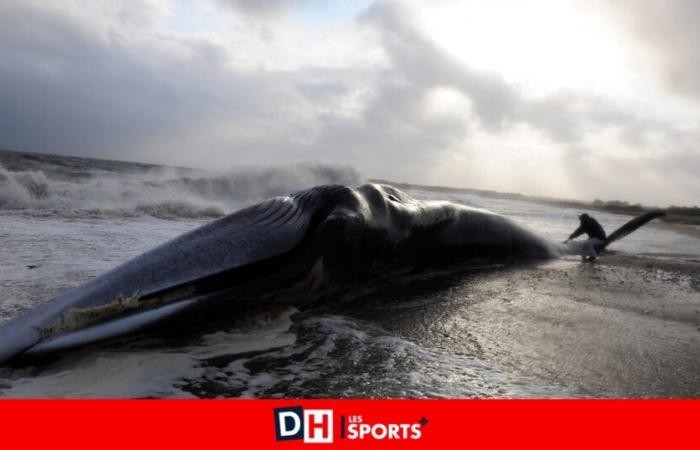According to the conclusions revealed by the newspaper Sud Ouest and published in October in the journal Nature Sciences Sociétés, the animal had died approximately a month before its stranding.
“I had never seen this”: a whale washed up on a beach in northern France (photos)
By studying the currents, the researchers reconstructed its drift and located the area of the death off the island of Noirmoutier, in the Natura 2000 classified area of the Celtic Seas and the slope of the Bay of Biscay.
A military frigate was then operating in this area under project management by the industrial company Naval Group, which was carrying out “qualification tests before delivery (…) for a foreign client”, in particular “sonar tests”, confirms Gaëlle Rousseau, responsible for the group’s eco-design.
Precautions
The manufacturer had asked the Atlantic Maritime Prefecture where to carry out these tests “at maximum power, in classic operational frequencies for submarine hunting”, she adds.
The authorities explain that they indicated the area concerned thinking that Naval Group “would apply the same precautions as the Navy”. “It was the first frigate intended for export to carry out tests. From now on, we will check further,” underlines the Maritime Prefecture, referring to “a fairly unique case”.
Naval Group has since worked with acousticians to quantify the environmental impact of sonars – its data on this subject “was not very rich”, admits Gaëlle Rousseau – and reviewed its procedures.
From now on, he gradually increases the power of the sonars “so that the sound scares away disturbed animals before injuring them” and makes sure not to carry out the tests in a protected area.
Any test is also preceded by a prior visual monitoring of at least 30 minutes. “At night, we use the bugs. We can also use a cartographic tool which records the presence of whales,” explains the manager.
The French Navy has been taking these precautions “since the early 2000s”, underlines the Atlantic Maritime Prefecture.
Fisherman discovers humpback whale about to explode: ‘In 27 years, I’ve never seen anything like it’ (VIDEO)
“Paper areas”
However, the regulations in force in protected areas remain very fragmented. In the area concerned, the Objectives Document, which allows the management of a Natura 2000 site, “is not finalized”, according to the authorities.
But “there will not be a total ban” on this type of test, they add, arguing for security reasons, “particularly in the current international context”.
The regulations do not take into account “impulse” noise, characteristic of sonar, but only that linked to propulsion, and only for civil vessels.
François Frey, founder of Esprit de Velox, demands “the same thing for the military” because “we cannot ask others to be very careful 365 days a year, so that the 366th, a warship comes to kill whales “.
He advocates a real “taking into account” of marine protected areas: “They are important, in number and in surface area, but we do trawling, oil research, wind power, etc., they are areas of paper without rules.
Scientists cite numerous precedents, such as in 2023 in Cyprus or this spring in Corsica, where three Cuvier’s beaked whales stranded after a military exercise in the Pelagos sanctuary, between Italy and France.
A French anti-submarine frigate, equipped with sonar, “effectively perceived the presence of (unidentified) marine mammals in the Tyrrhenian Sea”, according to the Maritime Prefecture of the Mediterranean.
The ship “immediately adapted its behavior and applied the national rules in force” limiting the use of sonars in the areas concerned “in order to preserve the cetaceans detected”, add the authorities.






